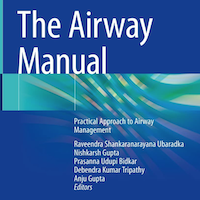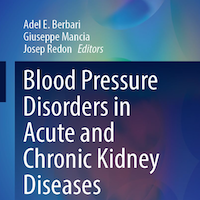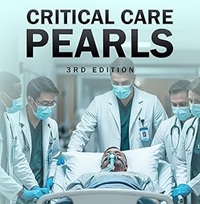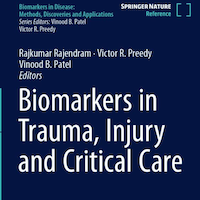Tag: guidelines
Vasopressin in Septic Shock: When and How to Use the Second-Line Vasopressor
SSC Guideline Recommendation: The Surviving Sepsis Campaign (SSC) weakly recommends adding vasopressin as a second-line agent instead of continuously escalating norepinephrine if a patient's mean arterial pressure (MAP) remains... read more
ICU Quick Drug Guide 2nd Edition
This book provides precise, must-have drug information for the ICU. It offers essential, evidence-based practice guidelines for the critical care setting. Now in its fully revised and expanded second edition, ICU Quick Drug... read more

Handbook of Sepsis
This recently released practically oriented book provides an up-to-date overview of all significant aspects of the pathogenesis of sepsis and its management, including within the ICU. Readers will find information on... read more

The Airway Manual: Practical Approach to Airway Management
The book provides up-to-date and easy to understand information on airway management with special emphasis on practical management along with required theory background and key points. It covers all aspects of airway management... read more

Handbook of Drugs in Intensive Care: An A-Z Guide
Now in its sixth edition, the Handbook of Drugs in Intensive Care is the essential guide to using drugs safely and effectively in the intensive care setting. The book is split into two sections: an A-Z guide to the drugs... read more

Delirium vs. Encephalopathy: Unifying the Approach to Brain Dysfunction
Current clinical practice and research are limited by the separate, or dichotomized, use of the terms "encephalopathy" and "delirium." This separation hinders a unified approach to understanding acute brain dysfunction. Encephalopathy... read more
Norepinephrine Dosing: A Historical Look at Reporting and Salt Formulations
Reporting on norepinephrine dosage has been inconsistent due to variations in how drug labels account for different salt formulations. This inconsistency creates problems in clinical practice and research by making it difficult... read more
The Role of Neuroimaging in Brain Death Diagnosis
Brain death remains a medically and ethically complex topic, due to its religious and philosophical implications, despite the attempt to "scientificise" what is death and what is not. BD is characterized by a lack of universal... read more
Fever Management with or without a Temperature Control Device After OHCA and Resuscitation
the TEMP‐CARE trial will advance our understanding of post‐cardiac arrest care fever management strategies. With a large sample size and a broad patient population, the results of this trial will inform clinical practice... read more
Cardiac Intensive Care
Using a multidisciplinary, team-oriented approach, this unique title expertly covers all the latest approaches to the assessment, diagnosis, and treatment of patients with critical cardiac illness. Led by Dr David L. Brown,... read more

Pulmonary Hypertension: Controversial and Emerging Topics
This book is a clinical guide to controversial and emerging topics in pulmonary hypertension. There are multiple challenges and unanswered questions encountered by clinicians that evaluate, diagnose and treat patients with... read more

Irwin and Rippe’s Intensive Care Medicine
With a focus on evidence-based, state-of-the-art information throughout, the eighth edition of Irwin and Rippe's Intensive Care Medicine offers authoritative guidance to the wide variety of specialty physicians and non-physicians... read more

New Insights: Inhaled Nitric Oxide in Severe COVID-19 Patients
This study provides novel insights into the use of inhaled nitric oxide in severe ARDS COVID-19 patients. Specifically, we demonstrate that the iNO effect of oxygenation improvement is delayed with a prolonged feature that... read more
Expert Consensus Statements on Lipids in Parenteral Nutrition
Lipids are integral to parenteral nutrition (PN) in all settings where PN is required, serving as a source of energy and essential fatty acids. In addition, lipids modulate a variety of biological functions, including inflammatory... read more
Fast-Track in Cardiac Anesthesia: Cardiac Surgery in the Era of ERAS
This new book, focused on fast-track approaches in cardiac surgery, covers ERAS cardiac guidelines, explores the application of loco-regional anesthesia in cardiac surgery, and addresses all aspects related to early extubation... read more

Preventing VAP Non-Pharmacologically
In critically ill, intubated patients on intensive care unit (ICU), ventilator-associated pneumonia (VAP) is a significant complication contributing to substantial mortality, morbidity, and prolonged stays, which in turn... read more
Critical Care Administration: A Comprehensive Clinical Guide
This book provides a state-of-the-art overview on critical care administration. The text reviews important aspects and considerations involved in developing an efficient, cost-effective critical care program, while maintaining... read more

Risk Factors for Traumatic Intracranial Hemorrhage in Mild TBI Patients
The findings from this study provide additional context to risk factors currently in use as components in guidelines for the management of mild traumatic brain injury (mTBI) in the ED setting, contrasting high risk predictors... read more
Reducing Deep Sedation and Benzodiazepine Use in Mechanically Ventilated Patients During Critical Care Transport
The rate of deep sedation in this cohort was consistent with previously published data; however, it remains higher than clinically indicated. Over the course of the QI project, the proportion of deeply sedated patients... read more
Feeding Challenges in the ICU
For critically ill patients, timely nutritional support can aid recovery and reduce mortality risk. But what about a patient in septic shock who is receiving vasopressor therapy, or one who requires prone positioning or extracorporeal... read more
Early sodium bicarbonate therapy for critically ill patients with septic shock and acute moderate metabolic acidosis
In recent decades, septic shock has continued to be a life-threatening health problem around the world. Meanwhile, metabolic acidosis (MA) is also well known in critically ill patients, and even moderate metabolic acidosis... read more
Critical Care Device Series: External Ventricular Drain
External ventricular drainage (EVD), is one of the most frequently performed neurosurgical procedures, with approximately 20,000 performed annually. EVD placement is often considered a lifesaving measure to alleviate severe... read more







